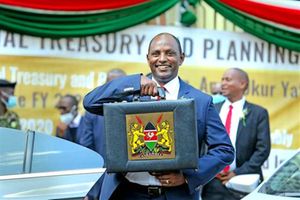
Retired public servants will get automatic pay raises based on the cost of living in pension computations.
Ms Rosemary Wanja, 71, juggles between weaving and selling baskets, planning for weekly weaving training for a group of women, and seeking driving tasks every once in a while.
An elderly woman who has also been battling arthritis over the past eight years, age is fast catching up with her, weighing down her expertise in driving- a career she has depended on since 1971- which has cut her chances of getting driving tasks.
But the responsibility to take care of her grandchildren, with whom she lives with at a rental house in Dagoretti, Nairobi, keeps her on toes, always striving to feed them.
Ms Wanja has, thus, had to increase her focus on weaving over the past four years, creating a niche in weaving baskets, furniture and door mats, all in the search for the money to pay her bills.

Rosemary Wanja, 71, during an interview at the offices of the Kenyan Aged People Require Information, Knowledge and Advancement in Dagoretti, Nairobi on December 7, 2023.
“I meet with a group of women in Nairobi's Adams once a week whom I train weaving of different items and get compensated for the services. I teach two teams, so I arrive at 8 in the morning. My first class begins at half past 8 and runs until noon. My second session runs from quarter to 2 pm, and I train them until 4.30pm,” she says.
The granny, who has also been unlucky in her pursuits to benefit from the government’s cash transfer support for elderly citizens, Inua Jamii, knows all too well that were it not for the efforts she makes, her grandchildren would suffer since their parents- her children- have equally been unlucky in finding any stable jobs to bring up their own families.
“I understand the fact that my children and some of the grandchildren have not been lucky in finding employment. One of them tends to the chicken I rear and the others don’t have stable jobs. My daughters are married as housewives. This, coupled with the fact that commodity prices have risen sharply, has brought a lot of problems. I must go out to seek money for my grandchildren to survive,” she observes.
A total of 2.9 million Kenyans were unemployed last year, a 98 percent increase from 1.5 million Kenyans who were unemployed 15 years ago.
Such has been the life for the mother-of-six, who now finds herself having to put up with the harsh city of Nairobi for survival, competing with millions of youth who are out aggressively to eke a living.
And she is not alone as she finds herself part of a growing number of elderly Kenyans who now have to work long past the age traditionally considered retirement time, when they would be expected to rest and play with their grandchildren.
The population of Kenyans aged 65 and above who are still working jumped by more than 71 percent over the past 15 years, latest data by the Kenya National Bureau of Statistics (KNBS) shows.
The KNBS analytical report on the labour force, drawing data from the 2019 census, notes that while the population of Kenyans aged 65 and above increased by 46.2 percent to 1.86 million in the decade to 2019, the number of Kenyans working past the age of 65 jumped from 886,850 in 2009 to 1,518,340 in 2019.
“The employment to population ratio of the older workers increased to 81.6 percent in 2019 from 66.7 percent in 2009,” the KNBS report observed.
The number of female workers past 65 years of age increased by 86.1 percent between 2009 and 2019, as that of male workers increased by 56.2 percent to 690,759. This means that the decade between 2009 and 2019 generated 382,987 new female workers aged 65 and above, and 248,503 new male workers of the age group.
Majority of the workers past the age of 65 constitute paid employees, who formed 39.1 percent of the workers in 2019, with 29.7 percent working as contributing family workers and 25.2 percent as own account workers, the KNBS report showed.
Retired Kenyans
The number of Kenyans working as paid employees over 65 has more than tripled over the past 15 years from 10.3 percent in 2009, data shows.
But further data shows that even for retired Kenyans living on pension, life has also not been easier as they continue to be burdened by hard economic times, many finding themselves having to take care of bills they would have thought they were done with, at old age.
Many are the pensioners who are today finding themselves taking care of their extended families, mainly grandchildren, a Retirement Benefits Authority (RBA) report revealed last year.
The RBA survey found that two in five pensioners used their payments to pay children’s school fees, and that 88 percent of the retirees were depended on by their children, grandchildren and extended family members.
“This may be indicative of the state of labour shortages in the country, further accelerated by the disruption to employment caused by the Covid-19 pandemic, where children of pensioners have resorted to depending on their parents, and in some cases, grandchildren,” the RBA survey observed.
Mr Kenneth Mwaura, 75, who worked for the Kenya Breweries Limited (KBL) for many years, represents another section of older Kenyans who form initiatives to address different courses after retirement, to stay active and achieve their objectives.
The graduate of Science, Chemistry and Physics from the University of Nairobi founded the Children's Environmental Rescue (CER) after retirement and believes in staying physically active to avoid being sluggish and worn out with age.

Kenneth Mwaura Gure during an interview with the Nationa at his home in Kiambu County on December 7, 2023.
When we arrive at his house on Eastern Bypass for the interview on an early Thursday morning, he has just been to a 5-kilometre walk, an exercise he does three times a week to stay in shape, before embarking on activities of the day.
“Our motivation is to create environmental awareness to prevent more human suffering caused by our casual approach to the environment. We feel called to promote Responsible Environmental Behaviour in our society to avert the ever-increasing tragedies,” Mr Mwaura says.
He collaborates with his wife, Margaret Mwaura, who has a Master's in Environmental Education.
Overall, Kenya had a working population of 17 million aged between 15 and 64 in 2019, half of whom (50.1 percent) worked for pay.
Of the 17 million; 9.55 million worked in Agriculture, 3.2 million in other service activities, 675,433 in wholesale and retail trade (repair of motor vehicles and motorcycles), 521,145 in construction and 505,935 in transportation and storage.
The trend of rising numbers of older Kenyans who are still working to make a living or achieve other objectives has not only been witnessed in the private sector, but also in the public sector where many continue to serve past the mandatory retirement age of 60.
While the Public Service Commission (PSC) lacks recent data on the subject, in 2020/21, it reported that out of 262 institutions with 233,951 workers, 149 officers were serving past retirement age.
“68.1 percent of the officers were serving on permanent and pensionable terms (159,460), 45,325 (19.3 percent) were on contract, 7.7 percent were on probation, 149 (0.06 percent) were on contract beyond the retirement age, while 3.4 percent of officers were serving on permanent [terms] without a pension,” the PSC stated in 2020/21.
“Out of the 149 officers serving on contract beyond the retirement age, 49 were from Ministries and State departments contrary to PSC circular Ref. PSC/ADM/13(7) dated 19th November 2020 and 1.2 percent of the officers were serving on temporary terms contrary to the provisions of the PSC Act and the Employment Act, 2017 that does not have a provision for this term of engagement,” it added.
The Auditor-General has also been raising concerns over continued holding of workers in government even after they cross retirement age, the increasing rate at which the query appears in her reports reflecting the reality that more older Kenyans continue to work even after the age they would presumably be in their sunset years, and resting.
In 2021/22, for instance, Ms Nancy Gathungu- the Auditor General- reported that some 10 counties had 422 workers they were still engaging, despite crossing the mandatory retirement age of 60, as per public service requirements.
“Analysis of the Integrated Personnel and Payroll Database (IPPD) data provided for audit for the financial year 2021/2022 revealed that 131 employees were above the mandatory retirement age,” Ms Gathungu reported on Garissa County.
During the financial year, Trans Nzoia County had the second-highest number of workers engaged past retirement age (69), followed by Isiolo County (51), Wajir (39), Murang’a (38), Narok (32), Samburu (18), Nyandarua (16), and Siaya and Kisumu (14 each).
“Review of personnel records revealed that the County Executive had 60 contractual employees, for a period exceeding six months, 30 of whom were above the age of 60 years. There was no evidence that there was an emergency and/or they were experts to warrant their employment on contractual terms beyond 60 years,” the Auditor-General reported on Trans Nzoia County.
Public Service
Holding of public service workers past retirement age contravenes Section D.21 of the Human Resource Policies and Procedures Manual for the Public Service, which states that all officers shall retire on attaining the mandatory retirement age of 60 years and 65 years for persons with disabilities.
The data showing that the population of working elderly Kenyans (65 years and above) as a proportion of the population has continued to grow underlines the quest of older Kenyans to make ends meet or achieve other lifetime objectives.
Mr Elijah Mwega, 67, who founded the Kenyan Aged-People Require Information, Knowledge, and Advancement (KARIKA)- an organization that equips elderly citizens with handcraft skills such as weaving, knitting, making soap and rearing chicken so that they can make a living even in old age- observes that the organization has been crucial for many old Kenyans, particularly in Nairobi, who have gained skills to make money.
He also says the organization has created a social environment for older people to combat isolation and keep them working despite reaching retirement age.

Elijah Mwega, the founder of Kenyan Aged People Require Information, Knowledge and Advancement, during an interview with the Nation at the CBO's offices in Dagoretti, Nairobi on December 7, 2023.
“I have a very tight schedule because I wake up early every day and be here for the older people because they come as early as 7am, and many of them want me to listen to them,” he says.
With the population of older Kenyans continuing to increase as the nation’s lifespan extends, more citizens will find themselves still actively in the labour market far past the official retirement age as defined by government and corporates, and with the cost of living rising even higher, the challenge can only get tougher for the citizens who have at such times lost the energy and speed of their youth.
About 16 million (83 percent) of the 19.1 million workers in the county by last year were in the informal sector, meaning that majority of them hit retirement age without savings to take care of themselves in old-age, and can’t thus afford to retire. Many end up retiring into poverty, majorly relying on insufficient government support through a cash transfer programme for the elderly, which hasn’t also addressed the full need.










